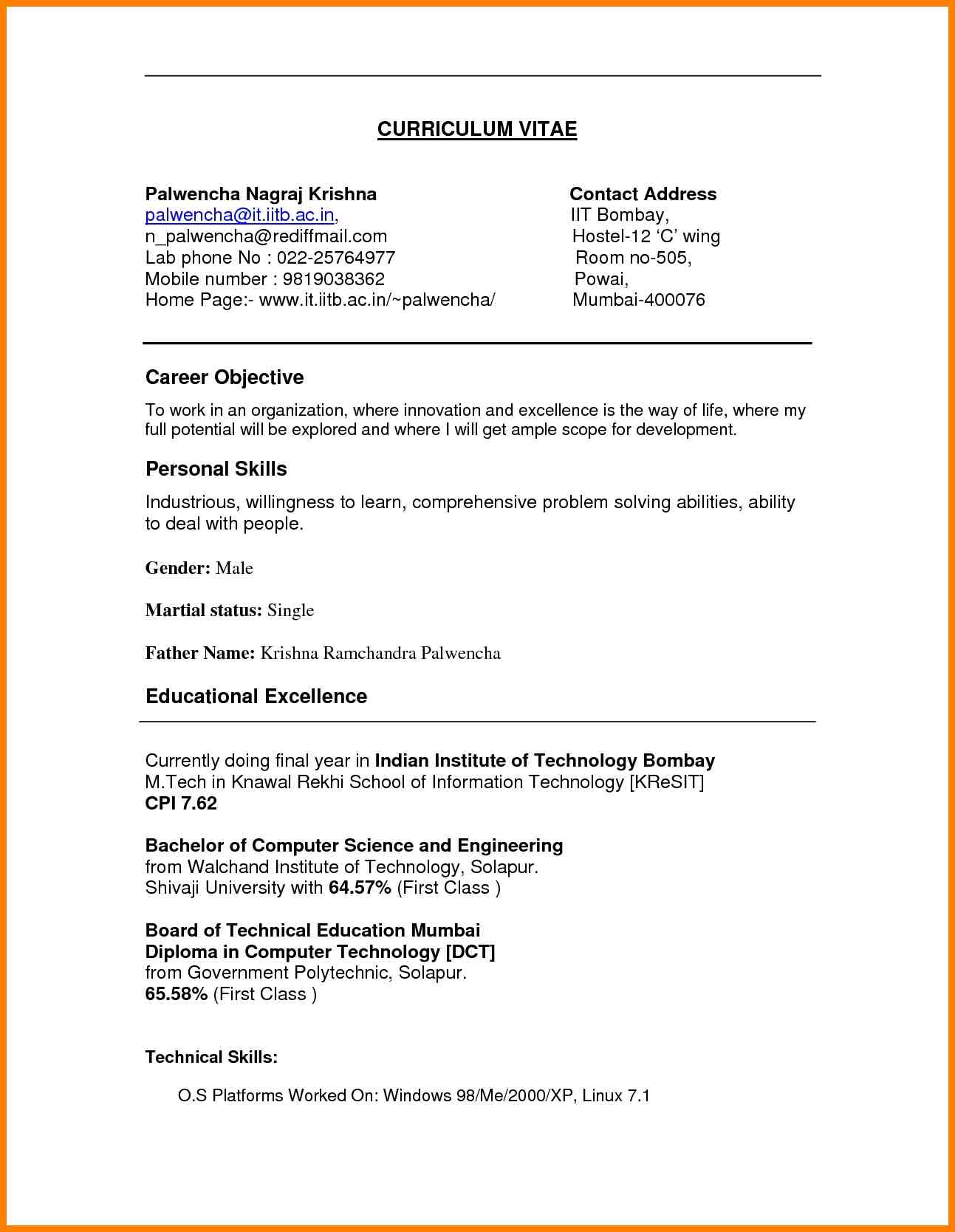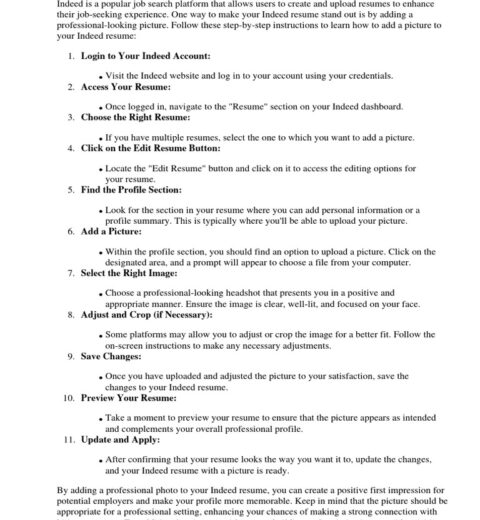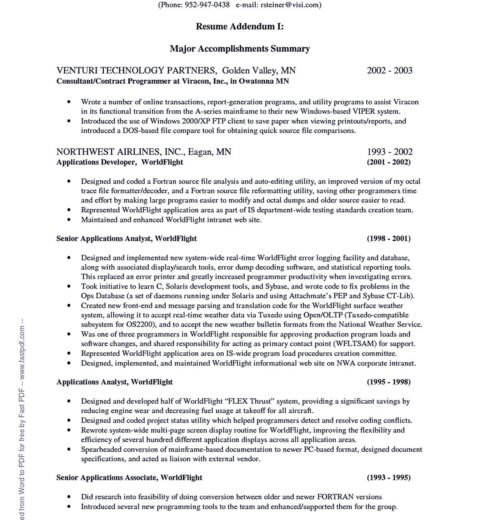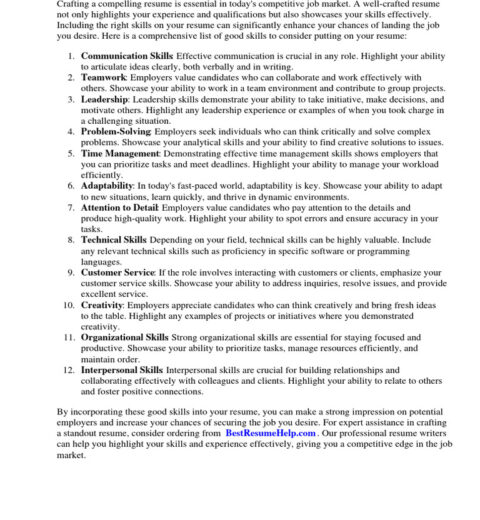In the competitive landscape of job hunting, the ability to effectively present one’s skills on a resume is paramount. Skills on a resume are not merely a list of abilities; they represent a crucial element of your professional identity. Understanding how to articulate these competencies can make the difference between landing an interview and being overlooked entirely. This deep dive into what constitutes skills on a resume and how to list them effectively promises to shift your perspective on this critical component of the job application process.
The term “skills” encompasses a broad spectrum of abilities that individuals acquire, hone, and utilize throughout their careers. Generally, skills can be categorized into two main types: hard skills and soft skills. Hard skills are the technical abilities specific to a profession, often quantifiable and easily demonstrable. For instance, proficiency in programming languages, graphic design software, or data analysis tools falls under the hard skills umbrella. On the other hand, soft skills relate to interpersonal and intrapersonal abilities. Examples include communication, teamwork, problem-solving, and adaptability. Both skills types are essential, but they must be presented distinctively to capture the attention of hiring managers.
One might ponder, why are skills so pivotal on a resume? Employers seek candidates whose skill sets align with the demands of the role. By showcasing relevant skills, candidates communicate their suitability for the position, thereby increasing their likelihood of being selected for an interview. For instance, a software engineer might specify expertise in Java and Python, while a marketing professional could emphasize strengths in SEO and content creation. This alignment serves as the first filtering mechanism that hiring managers employ when sifting through resumes.
When it comes to listing skills on a resume, precision and clarity are paramount. Herein lies the first approach: consider tailoring your skills to match the job description. By carefully analyzing the job posting, candidates can discern which competencies the employer deems most critical. This strategic alignment not only demonstrates your preparedness for the role but also signals your motivation and attention to detail. Absconding from generic descriptors like “excellent communication skills” can lead to a more compelling narrative, presenting skills within the context of past achievements and tangible contributions.
Consider employing the STAR method when detailing your skills to give prospective employers insight into their application. STAR stands for Situation, Task, Action, and Result. For instance, rather than simply stating, “I can manage projects effectively,” a candidate might illustrate this skill by saying, “In my previous role, I spearheaded a team project that enhanced efficiency by 30% within six months. This required coordinating multiple departments, planning schedules, and negotiating resource allocation.” Such a narrative not only elucidates the skill in question but also paints a vivid picture of the candidate’s capabilities and impact.
The selection of keywords is another critical aspect of skill representation. Utilizing industry-specific vernacular can enhance the visibility of your resume in applicant tracking systems (ATS), which many companies use to screen candidates. Keywords relevant to the role can ensure that your resume garners the attention it deserves. For example, a digital marketer might incorporate terms like “PPC,” “content strategy,” or “brand development” to resonate with both the automated systems and human reviewers alike.
Next, consider formatting. Organization and layout can dictate how easily a potential employer can navigate your skills section. A bulleted list provides a swift snapshot of capabilities, allowing hiring managers to grasp essential qualifications rapidly. However, skills can also be integrated into professional summaries or even embedded within descriptions of past roles for added context. Striking a balance between a visually appealing format and comprehensive detail is vital.
It would be remiss not to address the pertinence of updated skills in a rapidly evolving job market. Continuous learning is vital in maintaining relevance; hence, candidates should endeavor to upskill regularly. Engaging in online courses, attending workshops, and obtaining certifications not only bolster one’s capabilities but also provide fresh material for resume enhancement. Demonstrating a commitment to self-improvement can distinguish a candidate from the competition, showcasing adaptability and a forward-thinking mindset.
Moreover, do not underestimate the power of recommendations. References and endorsements from past employers or colleagues can significantly enhance the credibility of your skill claims. A well-crafted LinkedIn profile, imbued with testimonials and endorsements, can serve as a complementary tool for your resume, reinforcing your professed abilities with real-world validation.
Lastly, as you contemplate how to present your skills, remember the importance of authenticity. While it may be tempting to embellish capabilities, honesty is imperative. Misrepresenting oneself can lead to challenges in interviews and, worse yet, in exigent situations requiring the asserted skills. Authenticity in skill representation fosters trust and builds a solid foundation for future professional relationships.
In conclusion, effectively articulating skills on a resume is an intricate dance of relevance, clarity, and authenticity. By understanding the dual nature of skills—hard and soft—and employing strategic alignment with job descriptions, candidates can create impactful resumes that captivate potential employers. Combining narratives of past achievements with industry-specific keywords, structured formatting, and a commitment to continuous development culminates in an effective presentation of one’s professional identity. As you refine your skills section, remember that this is not merely a list; it is a critical opportunity to showcase your journey, potential, and fit for the roles you aspire to undertake.




